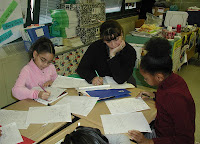Developing Our Skills As Teachers of Writing
The following notes are condensed from an address to Graduate teachers at Victoria University, December 3, 2012, prior to them taking up their first teaching appointments in schools in Melbourne’s Western Metropolitan Region in 2013.
When it comes to teaching writing it is important to be working along side young writers supporting them to:
•learn and grow
•follow our example as teachers who write
Connecting to the writing world of your students is critical. Consider the following questions:
‘Where teachers exercise control over topic selection rehearsal cannot take place because student writers have no forward knowledge about the writing that is expected. This rules out choice, ownership and the act of rehearsal.’
Out Damned Spot!
ACTION REQUIRED
USE LISTS!
As teachers we must; write to, for, and with students (We must know the attitudes, interests, and backgrounds of our students and focus on effective writing strategies and elements of the writing process. We must assess continually and share samples of our own writing in process and in final form. We must also reach into our school communities and help parents value children’s writing.
My summer urgings for Graduate teachers (in fact, all teachers!) is please, please, please:
•follow our example as teachers who write
•learn from understandings shared about writing
In our classrooms we must encourage students to become involved in the things that writers in the wider world actually do. As teachers need to do to do them too. If we don’t do these things we’re asking students to undertake tasks and teaching them to do things we’ve never attempted ourselves.
In our classrooms we must encourage students to become involved in the things that writers in the wider world actually do. As teachers need to do to do them too. If we don’t do these things we’re asking students to undertake tasks and teaching them to do things we’ve never attempted ourselves.
All writers need a place to keep ideas, thoughts, reactions, words, lists of names, places, anecdotes, words, phrases, short descriptions of people, places and events to trigger a memory for more in depth writing at a later time. Writers need a place to record reactions to the daily events in the world surrounding them. This is where the writer’s notebook becomes a critical component of the writing teacher’s life.
Connecting to the writing world of your students is critical. Consider the following questions:
•Where does my knowledge about teaching writing come from?
•Are some sources of knowledge more important than others?
•How do I develop my knowledge about teaching writing?
•Is my writing visible to students?
Quality literature, written by trusted writers are your co- teachers in the writing classroom. We must:
Seek it out
Acquire it!
Get familiar with it!
Learn to read like a writer!
‘Where teachers exercise control over topic selection rehearsal cannot take place because student writers have no forward knowledge about the writing that is expected. This rules out choice, ownership and the act of rehearsal.’
Source: Igniting Writing- When A Teacher Writes, Alan J Wright, Hawker Brownlow, 2011.
Writing is fun and rewarding to write when it feels real/authentic.
Writing is fun and rewarding to write when it feels real/authentic.
Writing needs to be approached in a way that teaches how to write, rather than what to write.
‘We write with the ear as much as with the eye or the mind. I believe that writing teachers and student writers might do well to shift attention from the what (subject/meaning) to the how (language).’
‘We write with the ear as much as with the eye or the mind. I believe that writing teachers and student writers might do well to shift attention from the what (subject/meaning) to the how (language).’
Source: Pyrotechnics on the Page-Playful Craft That Sparks Writing, Ralph Fletcher
Out Damned Spot!
Sentence Starters–teacher directs- students respond. -Entrenches dependency
Trying to control topics, genre, mode.
Teaching that deals with surface features to the detriment of developing the writer
Journal writing ad-nauseum!
In Every Lesson:
In Every Lesson:
•Encourage ownership
• Provide Choice
• Encourage responsibility for thinking about the relevance of the writing –the message.
•Encourage writers to only write about the things that matter to them and others (audience awareness)
‘By writing, students learn how to mesh multiple brain functions and ultimately that’s something you need to do efficiently. Writing helps to build and maintain brain pathways that connect functions such as language, memory and motor control. So writing assists the students to practice being organized and effective.’
‘By writing, students learn how to mesh multiple brain functions and ultimately that’s something you need to do efficiently. Writing helps to build and maintain brain pathways that connect functions such as language, memory and motor control. So writing assists the students to practice being organized and effective.’
Source: Dr Mel Levine. The Myth of Laziness
Consider This:
Consider This:
Students who work with teachers who demand minimal writing are educationally deprived. They may be less prepared to produce when they attain adulthood.
ACTION REQUIRED
Students need a lot of writing practice. (STAMINA)
Students need teachers who model good writing.
Students need many opportunities to read and study other writers.
Our work of teachers should be driven by the following beliefs:
Our work of teachers should be driven by the following beliefs:
Students must have opportunities to write in their notebooks regularly.
Students must be encouraged to write in places beyond the classroom.
Students must be taught to harvest ideas/topics from their life, reading and their thinking.
Students must have opportunities to make decisions about their writing intentions.
Students must have opportunities to employ strategies learned in workshops and conferences as well as working on their own ideas.
Students must learn to respect the integrity of the notebook by valuing it and having it accessible in class.
This Means We Must Provide:
Explicit/mindful lessons that provide opportunities for students to become more effective writers.
Modeling & sharing related to aspects of our own work as writers.
Respect for the integrity of student notebooks by not writing in them.
Assistance for students to practice the strategies effective writers know about conventional grammar and spelling so that their writing remains ‘reader friendly.’
Remember, Writing isn’t just WRITING. It’s also TALKING, DRAWING, THINKING and READING.
USE LISTS!
Lists provide multiple opportunities for young writers to explore potential writing ideas. The skill of brainstorming needs to be taught explicitly, just like any other skill. It needs to be explicitly linked to ORGANIZING!
Key Elements of Effective Writing Instruction -Create Real-World Reasons to Write
Key Elements of Effective Writing Instruction -Create Real-World Reasons to Write
Writing occurs best when students have a variety of real reasons for writing: a variety of real purposes, real audiences and a variety of real contexts.
Writing is a risk-taking operation. Students trust that their writing will be accepted and valued. Trust is a prerequisite for their continued willingness to engage in writing.
As teachers we must; write to, for, and with students (We must know the attitudes, interests, and backgrounds of our students and focus on effective writing strategies and elements of the writing process. We must assess continually and share samples of our own writing in process and in final form. We must also reach into our school communities and help parents value children’s writing.
My summer urgings for Graduate teachers (in fact, all teachers!) is please, please, please:
Develop A Writer’s Notebook Treat yourself to some reading (recreational and professional)
Treat yourself to some books (build your library of mentor texts)
Harvest Ideas!
Quarantine some time for writing






"Writing is fun and rewarding to write when it feels real/authentic.
ReplyDeleteWriting needs to be approached in a way that teaches how to write, rather than what to write."
These are the words that shout at me while I read this during my creative writing class. All semester long, as we looked at different ways to write, I also gave choice. "Write your life" I tell them. And they do. We wrote stories and narratives, arguments, persuasion, poetry. And now, in their final piece, most are going back to the forms they liked the best, but some are trying new things. But for them, it's authentic. They write their life.
If you're a big fan of this sub genre then you will already know a lot about what has been good writing skills before.
ReplyDelete